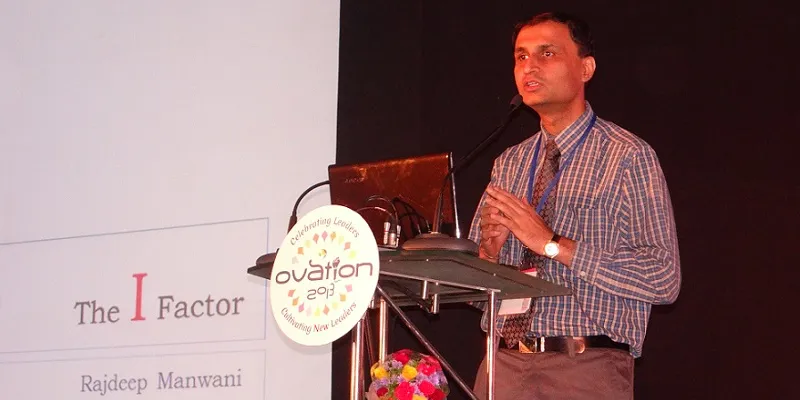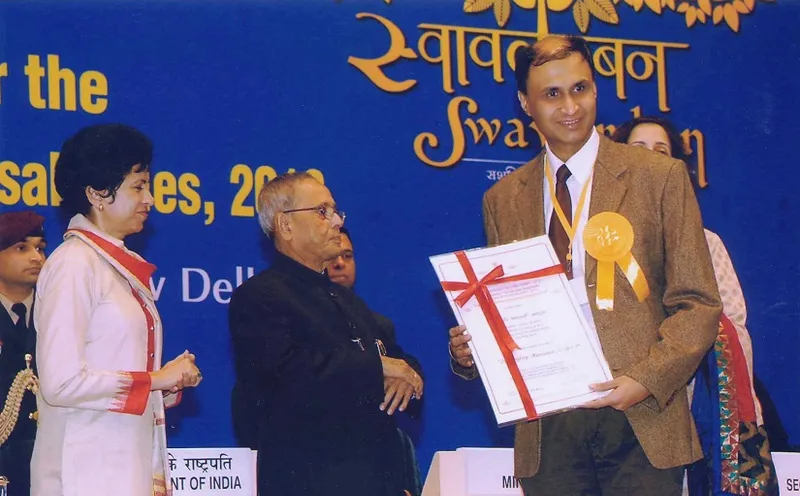His world might be dark, but Rajdeep Manwani has been a beacon of light for thousands
Adversity is said to be the most effective teacher. After all, it is extreme pressure that transforms the common carbon into sparkling diamonds. Rajdeep Manwani’s story begins with him losing his eyesight due to macular degeneration at a very young age. The condition causes damage to the retina leading to a gradual loss of eyesight. By the time Rajdeep turned 13, he had lost 65 percent of his vision. He was struggling to even read his course books. One day, depressed and scared about his future, he burst out crying. His father told him, “Don’t keep your dreams in your eyes; they will wash away as tears. Keep them in your heart so that each heartbeat reminds you to reach your dreams.” His father might be no more but these are the words that Rajdeep lived by every day. Today, 44-year-old Rajdeep is a lecturer, motivational speaker, life coach, and an occasional quiz master.

Impossible is nothing
A lecturer at Jain University in Bengaluru, Rajdeep completed his M.Com, MBA, and M.Phil and has also secured a doctorate in commerce. What’s more, he was the university gold medallist in both M.Com and M.Phil.
Rajdeep says, “I have motivated and mentored over 15,000 students and executives during the last 18 years. My corporate clients include Britannia, SBI, Pantaloon retail, WIPRO, and Kotak life, to mention a few.”
An eloquent speaker, Rajdeep has been awarded distinguished Toastmaster by Toastmasters International. He has spoken at a TEDx conference on the topic of success and shared the stage at India Leadership Conclave with adman Prahlad Kakkar and Sri Sri Ravishankar. He has also received a National award for being a role model for empowerment of persons with disability from the President of India Pranab Mukherji.

Navigating hurdles every step of the way
Of course, it was not easy getting to the place he is in today. Rajdeep recalls, “I remember the days when I worked as a telephone operator at an electronics shop to fund my studies and support my family after my father’s death. There was an NGO that used to make recordings of textbooks. I would listen to those audio cassettes on a Walkman until I mastered the concepts.”
After completing his masters, Rajdeep wanted to achieve his childhood dream of becoming a teacher. He felt teaching would give him the opportunity to make a difference and touch lives. Getting employment as a teacher was not easy despite his brilliant academic record. After 16 rejections, he got an opportunity at Sri Bhagawan Mahaveer Jain College, now known as Jain University. Getting a job was just the first step. Rajdeep then had to overcome the challenges that he faced as a teacher.
To Sir, with love
In Rajdeep’s own words, “Students were unimpressed by my classes initially. When I was wondering what I could do to make my teaching better, I happened to hear an interview of Jack Canfield, writer of the Chicken Soup for the Soul series of books, on radio. The book sold six million copies within two years of publication and how he achieved that kind of sales intrigued me. Jack in his interview on ABC said that he applied the rule of three.” Rajdeep explains,
Even if you cut the tallest and strongest tree three times in a day and sharpen your axe every evening, it would fall within six months. Jack did the same thing. He did three things to promote his book every day and it became a success. I was impressed and decided to do one thing every day to improve my teaching skills.
This was in 1996. Rajdeep went to his college library and requested the librarian to read out some excerpts from books on management, which would help him make his class more interesting. The next day, he started working on his voice modulation with a dramatist. Each day he would try something new and in less than two years, he mastered the art of teaching. Soon, the students were actively seeking out his classes.
Rajdeep also met his wife soon after and today the couple are parents to a nine-year-old boy.
The mentor and counsellor
Rajdeep’s inherent empathy propelled him towards counselling and he soon became a part of the mentorship programme at the university. Counselling is all about empowering a person to take his or her own decisions and it was an exact match with Rajdeep’s vision of making a difference to others. He also started taking motivational sessions for students, professionals from the corporate sector, NGOs, and other organisations.
Rajdeep speaks on topics like conquering fear, feeling empowered, and the meaning of success.
The story of his initial foray into quizzing is an interesting one. His first stint as Quizmaster was when someone backed out of a Quiz at his college. Rajdeep stepped in but since he could not read slides on stage, he had to memorise all 30 questions. He measured the size of the stage by walking end to end before the competition started. Once on the stage, he managed well and gained confidence. Since then, he has conducted quizzes for Nokia, Deutsche Bank, and several organisations.
We are all heroes
Rajdeep says, “I believe that there are difficult people and situations in your life to teach you many lessons and these experiences make you a better person.”
Rajdeep also believes that a hero is a person who is an inspiration to those around him. This is his driving philosophy - “I think we all are in our hero’s journey trying to become better every day and live our life to our fullest potential.”
Rajdeep’s message for entrepreneurs
Rajdeep believes that success is of two types – relative and absolute. Relative success comes from comparing with another person and fluctuates with who you are comparing yourself with. Absolute success comes from within and is constant. He says,
Most successful entrepreneurs in the world have tried to fill a gap in consumer needs, and commercial success has just been a natural fall out of the idea to make the life of another person better.
He further adds, "Muhammad Yunus, the Nobel laureate of Grameen bank, started the bank with the aim to eradicate the debt trap of poor bamboo workers in Bangladesh. Walt Disney made animated films to bring joy and laughter to children. Their success was absolute and it later became a relative success too."
He believes that when you chase relative success there is no guarantee that you will be happy as you are relying on a group of people over which you have no control and nobody in the world will always be satisfied with what you do. However, when you do things for your own satisfaction relative success will gradually follow.







